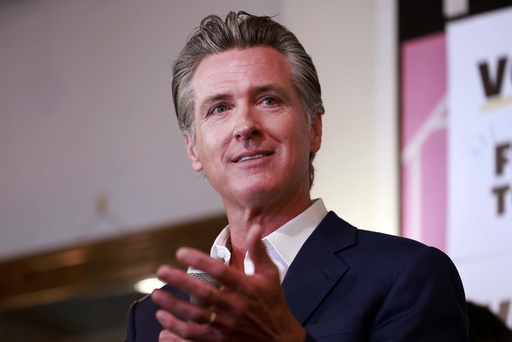SACRAMENTO, Calif. (AP) — California Gov. Gavin Newsom announced Tuesday that he wants to restrict students’ usage of smartphones during the school day, citing the mental health risks of social media.
The announcement, which was first reported by Politico, comes a day after U.S. Surgeon General Vivek Murthy called on Congress to require warning labels on social media platforms and their effects on young people. Newsom said he plans to build on a law he signed in 2019 that authorized school districts to limit or ban the use of smartphones by students while at school or under the supervision of a school employee.
“As the Surgeon General affirmed, social media is harming the mental health of our youth,” the Democratic governor said in a statement. “I look forward to working with the Legislature to restrict the use of smartphones during the school day. When children and teens are in school, they should be focused on their studies — not their screens.”
Newsom’s office did not provide further details on the proposal. But the California School Boards Association said any regulations over student smartphone use should be left up to school districts, not the state.
“We support legislation which empowers school leaders to make policy decisions at a local level that reflect their community’s concerns and what’s necessary to support their students,” spokesperson Troy Flint said.
Newsom’s announcement comes amid growing debate across the country over how to address the impacts of social media and smartphone usage, particularly on young people. Some teens have pledged to stay off social media to improve their mental health and to help them focus on schoolwork and extracurricular activities.
In Florida, Republican Gov. Ron DeSantis earlier this year signed one of the most restrictive bans in the nation on children’s use of social media. The New York state Legislature passed a bill earlier this month that would allow parents to block their kids from getting social media posts suggested to them by the platform’s algorithm.
In California, a proposal to fine social media platforms for addicting children has failed to become law in recent years. But a bill by state Sen. Nancy Skinner, a Democrat representing Berkeley, that would ban online platforms from providing addictive feeds to minors passed the state Senate in May and is set for a committee hearing in the Assembly next month.
The Los Angeles Unified School District board voted Tuesday for the district to develop policies banning students’ use of cell phones throughout the school day, with some exceptions. Board Member Nick Melvoin, who was a teacher and visits school campuses regularly, said he’s been “struck” by how “students are glued to their cell phones, not unlike adults.”
“When I talk to teachers and students and parents and principals, I also hear the same, which is that more and more time is being spent on policing student phone use,” he said at the meeting. “There’s not coherent enforcement, and they’re looking for some support from the board and from the district.”
State Sen. Henry Stern, a Democrat representing part of the Los Angeles area, introduced a bill this year to expand school districts’ authority to limit students’ social media usage at schools. Stern said he’d be willing to pull his bill, which already passed the Senate, if lawmakers and Newsom can come up with a better solution. Stern said he texted Newsom to thank him after the governor’s announcement.
“It’s just too hard for every teacher, every school, or every parent to have to figure this out on their own,” Stern said. “There’s some times where government just has to step in and make some bigger rules of the road.”
___
Austin is a corps member for The Associated Press/Report for America Statehouse News Initiative. Report for America is a nonprofit national service program that places journalists in local newsrooms to report on undercovered issues. Follow Austin on the social platform X: @sophieadanna
This website uses cookies so that we can provide you with the best user experience possible. Cookie information is stored in your browser and performs functions such as recognising you when you return to our website and helping our team to understand which sections of the website you find most interesting and useful.
